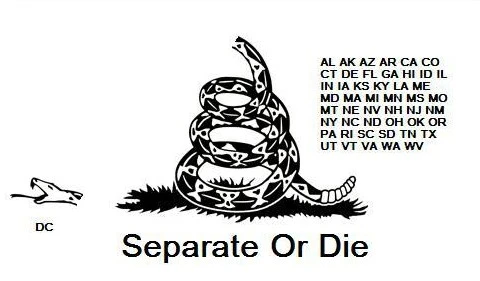Learn Liberty gets the situation backwards in its recent article bemoaning talk of national divorce as “the fuel that nourishes tyranny; feeding it will only starve the liberty movement.”
The truth is divorce as a means of reducing federal influence may be the only thing that can save us from the rising tensions that nourish tyranny.
The article argues that we should not feed into “wedge issues” and instead focus on the core uniting American libertarian principles from our founding.
“Talk of “national divorce” has grown as Americans are being driven apart by political wedge issues designed to keep them afraid of the “other”. The opportunity for libertarians in this moment is not to celebrate divisions but rather to remind Americans of the principles that inspired the creation of a government; these allow people of vastly different beliefs to co-exist peacefully together.”
It goes on to describe, “A version of America held together by our common belief in the natural rights enumerated in our Declaration of Independence and our Constitution, that have survived for the last two and a half centuries while other countries around the world have dissolved or fallen apart.”
The problem is that Learn Liberty’s version of America sounds foreign to me. It is true that the largest global populations of people holding these values exist in parts of the US, but it does not describe the 350 million people in the United States with any accuracy. The wedge issues driving us apart are not only the cultural preferences people want to enforce on each other, but deep ideological divides, including the importance of liberty itself, which the article states the country was largely founded on…. but unfortunately, no longer resembles.
If people are divided on fundamental issues of liberty, then using the federal government to promote what we view as universal libertarian rights won’t get us very far.
The article claims “A national divorce leading to multiple separate fragments of a formerly United States would only further embolden authoritarians in the Democratic and Republican parties.”
Authoritarians are emboldened by conflict, but an issue only has to be resolved if people are forced to agree upon it. It is much easier to agree to disagree. Just like it is easier to convince a progressive that Californians should take care of their own healthcare and leave Floridians to their own devices and medical freedom, than it is to convince them to abandon the concept of “universal” healthcare. The ones advocating going our separate ways are not fueling conflict, we are offering a compromise people can actually live with.
The real wedge dividing the United States is not a particular issue, but the increasing tendency for those issues to be resolved at the federal level. Leaving various factions to fight over it for supreme control, like gladiators thrown in a pit jostling for a single sword.
Roe v. Wade has been widely recognized, even by Ruth Bader Ginsberg, as the cause of one of the biggest wedge issues in American politics. That is precisely because it made abortion an issue that was decided at the federal level, dividing the entire country in the process. This happens with every aspect of increasing federal control which is unlikely to slow itself down. National divorce is offering a way out of the pit, so we don’t have to fight until there is only one person or cultural orthodoxy left standing.
The age of information has blown the lid off a corrupt and manufactured consensus, as people are now rediscovering their own values and learning how to consistently apply them.
The fracturing and rediscovery of different value systems because of the information age means that it will be continually harder for the United States to maintain a single orthodoxy. The more disparate value sets you have within one territory, the more tyrannical the state must be (by definition) to enforce a single orthodoxy. This can be logically deduced but also tracked. A 2009 study called “Regulation and Distrust” found a positive relationship across countries between the percent of people who said “most people cannot be trusted” and higher levels of regulation called for.
This is a common problem in Africa and the Middle East: National borders drawn around a multitude of cultures putting them in the dilemma of what the nation will represent. This leads to either one culture dominating the other, or a strong man secular dictator as the only means of maintaining peace.
Iraq for example “dates back to 1920, when the British Mandate for Mesopotamia, joining three Ottoman vilayets, was created under the authority of the League of Nations.” This territory ended up containing Sunni, Shia, and a small Kurdish population under one “nation”. This created an unresolvable tension that led to one side dominating the other, until Saddam Hussein, a secular strong man, emerged as the only solution for “unity. However, the true peaceful solution would have been that Iraq did not have to be a single territory, like the British, their dictator or the United States military insisted.
This tension would not have existed if Iraq was split along its true nations, which were made up of different cultures and value sets. The result of trying to hold on is it will fall apart regardless but in a more painful manner. Countless countries have been in perpetual turmoil trying to manage the same impossible dilemma. The dozens of arbitrary borders drawn around massive groups of people are the most significantly damaging legacy of colonialism and the most overlooked.
Why must people of different values be at constant war so countries with square borders can maintain the arbitrary lines drawn 100 years ago?
And why would the United States be immune to this same pressure in the face of fracturing values?
What makes people think a unified United States would look more like a libertarian utopia than Saddam’s iron fist? The choices are 1), fueling a factional war by relying on the federal government as a protector of rights, or 2), a peaceful separation.
In our current political landscape, the only potential uniting narrative would be some form of populist socialism that successfully incorporated the nationalist narrative. That is what hypothetical “unity” is more likely to look like in America rather than a return to the “libertarian principles of our founding.”
When you have the vision to understand the source of rising tension, it would be unwise to wait for a tyrant to emerge before saying you would finally “advocate independence”, as Zach Weissmueller suggested in ReasonTVs interview with Dave Smith on national divorce. Zach’s logic is that “radical ideas” like national divorce are a dangerous gamble only to be taken in the most extreme circumstance and he prefers the “humble incremental approach” of federalism.
There may be discomfort in broaching the idea, but what is more frightening is how bad things will get if you don’t. Pushing a political strategy of independence and federal nullification now may be the only thing that saves us from a worse tyranny emerging later. As polls indicate 20-40% support for the US breaking into more than one nation and talk of national divorce “grows” it is not something to shy away from and denounce, it is a huge opportunity for libertarians who should be leading on this issue.
We can still appeal to the values in the constitution and a tradition of federalism where it suits us, but it is dangerous to rely on the federal government to implement libertarian values top down. An easy way to test if relying on the federal government as a protector of rights is working is to ask: are they doing more to protect or infringe on individual rights on net? It only takes a couple alphabet agencies to swing the pendulum to net negative.
The only hope for peace is through separation. Just like an overdue breakup.
And the only hope for liberty is for people to associate with like-minded people as we rediscover our values. If we accomplish that, the divorce rate may go down for once.
The best chance for us to see the values of liberty pursued is to give the biggest freedom loving populations in the world some leeway from the federal government. What we need are states/municipalities able to assert more independence, case studies to prove the success of our ideas, the ability to inspire people and to pressure the despots that don’t respect our ideas or desire change. This is the humble and incremental approach. Much in the same way that the American revolution prompted revolutions in Europe, and later the expansion of property rights and civil liberties in the rest of the world. We don’t need federal or global universalism, let alone in a universe that is largely against us. We need choice to demonstrate universal truths.

